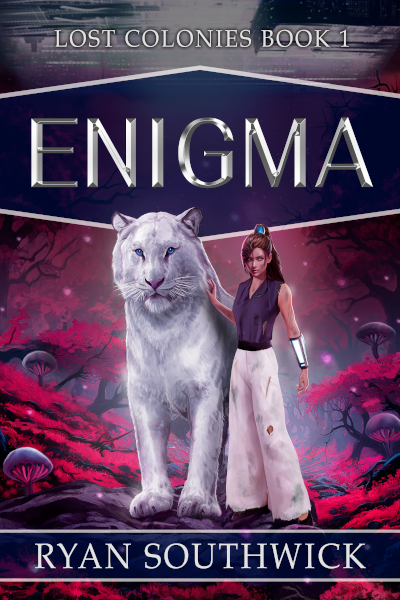SPSFC 4 Quarterfinalist: Enigma
Seven score and 14 days ago, the judges of Ground Control to Major Tom received 32 books in our scout pile for the Self-Published Science Fiction Competition (SPSFC). Team members read the novels and we picked six to become quarterfinalists. They're now being read by all judges on the team to decide our two semifinalists.
The last book we are announcing as an SPSFC 4 quarterfinalist is Enigma by Ryan Southwick.

Nearly 10,000 years ago Earth was conquered by the Uu'nok, sending survivors scattering across the galaxy in nine colony ships to build human civilization anew, far from the reach of the usurpers. Twenty years ago faster-than-light fold engines were developed, bringing four of the Lost Colonies together again. A lot of differences can arise over a decamillennium. Galileo colony embraces science and pacifism, Entropia personal liberty and Fortunus unfettered capitalism. Vice takes the more practical (make that pessimistic) view that high-minded ideals are secondary to the ability to wage war.
Galileo Ambassador Britta Silverstar welcomes diplomatic representatives of the other colonies to a space station orbiting Enigma, a galactic backwater that has unexplained atmospheric interference which defeats probes. The ambassadors view the planet as such a big yawn they're more interested in hooking up than asking questions. Then Britta presents them with a history-making show-and-tell:
[A] high-altitude picture appeared of a lush planet. A thick forest of fuchsia-leaved trees lay directly below. Snow-topped mountains peaked the outer edge.
What made everyone stare, however, was the faint cluster of lights in the upper-right quadrant.
Tanner stepped closer, squinting at the image. "Natural phosphorescence?"
"That was our first guess, until we zoomed in and cleaned up the image."
Britta triggered the next program sequence. The picture changed. It was grainier than the first, but a round of gasps said the implications were clear to everyone.
"Buildings," Hausen said softly. "And roads. Who are they?"
"We're not entirely sure."
"Human?" Bard said, eyes glinting.
"Yes and no."
Another lost colony has been found, this one reduced to horse travel and feudalism. After more probes and a human-piloted mission all lose contact, Britta reveals plans the best scientists of Galileo have devised to visit Enigma on a newly constructed space elevator. Quickly this best-laid scheme gang aft a-gley, which is how a Scottish poet says FUBAR.
An unforeseen betrayal sends Britta to the planet surface in an "accident" where she's believed dead. Her closest friend Crystal, a quirky fold scientist, is still laid flat by grief when she must flee the station to stay alive. These women have a friendship that transcends the term and both must play a crucial role in the spiraling events without their better half.
Several judges were intrigued by the colonies going through the awkwardness of a human family reunion at a moment where the urgency of cooperation couldn't be more life and death.
Richard's Reviews (Goodreads):
The plot centers around the themes of fighting vs. pacifism and weapons vs. diplomacy with our main character, Britta, working to build cooperation between divergent worlds and cultures. That does not mean there aren't a few fights and battles but this book is anything but a typical space opera. Don't let the mention of diplomacy fool you, the action in this tale is non-stop and I found myself reading faster and faster to find out what came next.
What comes next for SPSFC is the announcement of semifinalists in no score and 19 days.
Add a Comment
All comments are moderated before publication. These HTML tags are permitted: <p>, <b>, <i>, <a>, and <blockquote>.

